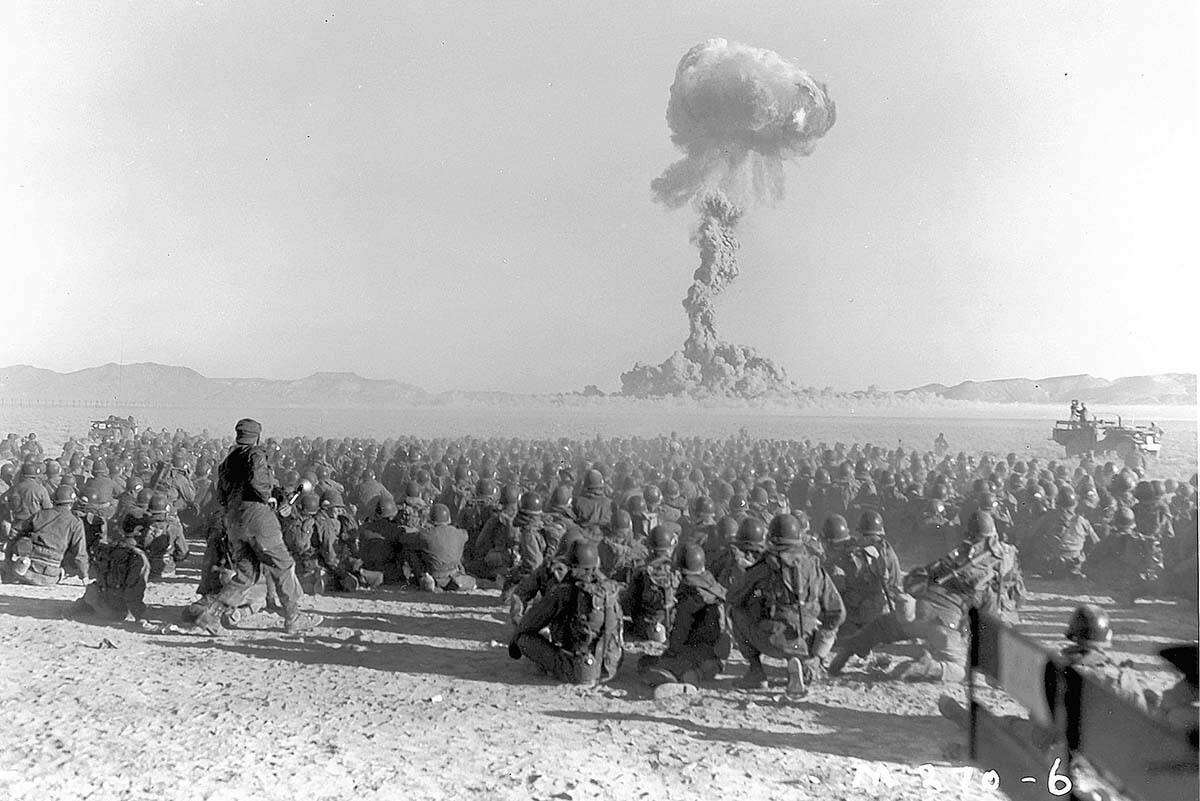NEVADA VIEWS: Don’t make Nevada radioactive to tourism
Las Vegas, a city known for its dazzling lights, world-class entertainment and vibrant tourism industry, also carries a heavy historical burden — one that should not be repeated. While visitors flock to the Mob Museum and the Atomic Museum to reflect on the past, these institutions should serve as reminders, not blueprints for the future.
The city triumphed over organized crime and, thanks to a 1992 moratorium on nuclear weapons testing, the city no longer faces the looming specter of nuclear detonations. Now, some in Washington are calling for a return to nuclear testing, which would occur some 65 miles northwest of Las Vegas. This would be a dangerous and unnecessary step backward.
Las Vegas thrives on tourism. Its economy is heavily dependent on casinos, hotels and entertainment venues and welcomed more than 40 million visitors in 2023 alone. A resumption of nuclear tests, even below ground, would cast a shadow over the city’s image, raising fears about radiation exposure and environmental degradation. This is not an unfounded concern — Nevada’s history with nuclear weapons testing has left a deep and lasting stigma. The mushroom clouds of the 1950s and ’60s turned the state into an international symbol of nuclear Armageddon, a reputation that Las Vegas has worked tirelessly to shake.
Should nuclear testing resume, the potential negative shock wave to tourism could be devastating. The last time underground nuclear tests caused earthquake-like tremors that shook buildings in Las Vegas, terrified guests flooded hotel switchboards. Travelers considering Las Vegas today may hesitate to visit a region associated with renewed nuclear weapons testing, leading to declining hotel occupancy rates, job losses and a reduction in revenue for local businesses.
One of the primary justifications given for a resumption of testing is to verify the continued reliability of the U.S. nuclear arsenal. This reasoning is flawed. Since the cessation of nuclear testing in 1992, the United States has maintained the safety and effectiveness of its nuclear weapons through the Stockpile Stewardship Program. This program allows the Department of Energy and its National Nuclear Security Administration to oversee annual certifications of the safety, reliability and effectiveness of the stockpile, using sophisticated experimental facilities, computer modeling and non-nuclear “subcritical” testing at the Nevada National Security Site. These efforts have proven extraordinarily successful and have sparked significant scientific advances. There is no evidence to suggest that underground nuclear detonations are needed to ensure the functionality of our weapons.
Nevadans who lived here during testing remember the detonations that shook our state and compromised residents’ health. The Nevada National Security Site bears the scars of decades of nuclear explosions. Land and water resources in the area remain contaminated, with long-term consequences for the environment and local communities. With our state government still dealing with the environmental fallout from testing conducted decades ago, why would we willingly introduce more potential contamination?
The health consequences have been, and continue to be, extensive — as is their financial toll. The Radiation Exposure Compensation Act program has already awarded more than $2.5 billion to more than 39,000 claimants across the American Southwest, including residents of Nevada, Utah and Arizona, who lived downwind of the Nevada Test Site and developed cancers and other life-threatening diseases from the era of above-ground testing. More than 20,000 claims have been filed by former Nevada Test Site employees and contractors
Restarting nuclear weapons testing would be a needless gamble — one that could irreversibly damage Nevada. Instead of reviving old fears and outdated practices, we must commit to a future that prioritizes innovation, diplomacy and sustainability. The age of reckless nuclear experimentation should remain in the museum where it belongs.
Sig Rogich is president of The Rogich Communications Group, an international communications and business advisory firm based in Las Vegas. He previously served as U.S. ambassador to Iceland and White House senior adviser for President George H.W. Bush.

















